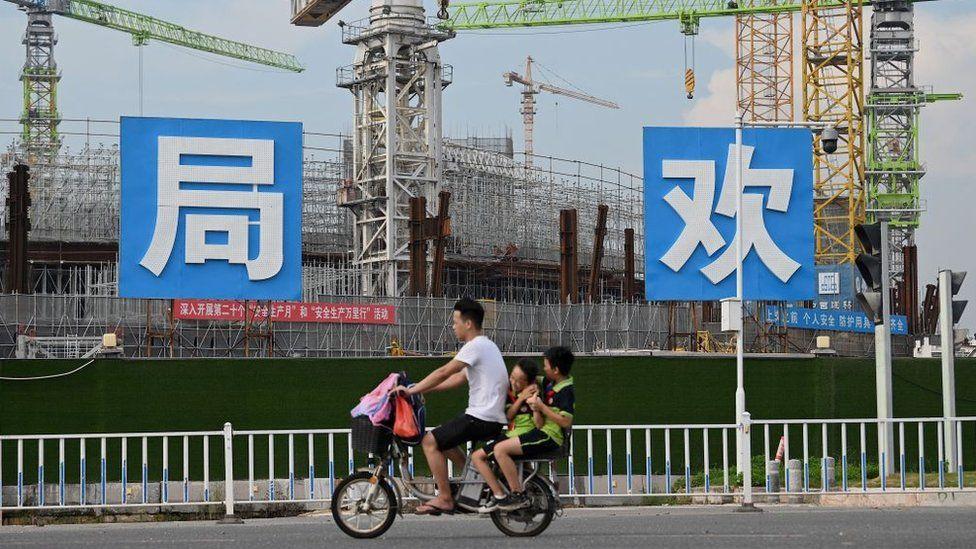- Published
A crisis at the world's most indebted company has worsened after news it had missed a crucial repayment deadline.
Chinese property giant Evergrande, whose liabilities exceed $300bn (£228bn), failed to meet interest payments to international investors.
That prompted Fitch, an agency that rates companies' financial risk, to declare Evergrande in default.
The crisis has spooked investors who fear contagion across China's property and banking sectors.
Evergrande had been due to repay interest on about $1.2bn of international loans on Monday. But by Wednesday the money had still not been transferred.
On Thursday, Fitch, one the world's biggest credit rating agencies, declared Evergrande in default, a move that could hamper the company's restructuring talks with investors.
Fitch, whose risk ratings are closely followed by major investors seeking to deploy billions of dollars, said it contacted Evergrande about the non-payment but received no response. "We are therefore assuming they were not paid," it said.
Evergrande has been selling assets in recent months to raise the money it owes to customers, investors and suppliers.
In a statement last Friday the company said it could not guarantee "to perform its financial obligations", sending its share price crashing.
What does Evergrande do?
Businessman Hui Ka Yan founded Evergrande, formerly known as the Hengda Group, in 1996 in Guangzhou, southern China.
Evergrande Real Estate currently owns more than 1,300 projects in more than 280 cities across China.
The broader Evergrande Group now encompasses far more than just real estate development.
Its businesses range from wealth management, making electric cars and food and drink manufacturing. It even owns one of country's biggest football teams - Guangzhou FC.
Mr Hui was once Asia's richest person and, despite seeing his wealth plummet in recent months, has a personal fortune of more than $10bn (£7.3bn), according to Forbes.

Why is Evergrande in trouble?
Evergrande expanded aggressivelyto become one of China's biggest companies by borrowing more than $300bn.
Last year, Beijing brought in new rules to control the amount owed by big real estate developers.
The new measures led Evergrande to offer its properties at major discounts to ensure money was coming in to keep the business afloat.
Now, it is struggling to meet the interest payments on its debts.
This uncertainty has seen Evergrande's share price tumble by almost 90% over the last year.
Why would it matter if Evergrande collapses?
There are several reasons why Evergrande's problems are serious.
Firstly, many people bought property from Evergrande even before building work began. They have paid deposits and could potentially lose that money if it goes bust.
There are also the companies that do business with Evergrande. Firms including construction and design firms and materials suppliers are at risk of incurring major losses, which could force them into bankruptcy.
The third is the potential impact on China's financial system: If Evergrande defaults, banks and other lenders may be forced to lend less.
This could lead to what is known as a credit crunch, when companies struggle to borrow money at affordable rates.
A credit crunch would be very bad news for the world's second largest economy, because companies that can't borrow find it difficult to grow, and in some cases are unable to continue operating.
This may also unnerve foreign investors, who could see China as a less attractive place to put their money.
Is Evergrande 'too big to fail'?
The very serious potential fallout of such a heavily-indebted company collapsing has led some analysts to suggest that Beijing may step in.
The Economist Intelligence Unit's Mattie Bekink thinks so: "Rather than risk disrupting supply chains and enraging homeowners, we think the government will probably find a way to ensure Evergrande's core business survives."
Others though are not sure.
In a post on China's chat app and social media platform WeChat, the influential editor-in-chief of state-backed Global Times newspaper Hu Xijin said Evergrande should not rely on a government bailout and instead needs to save itself.
This also chimes with Beijing's aim to rein in corporate debt, which means that such a high profile bailout could be seen as setting a bad example.
Reporting by Peter Hoskins




